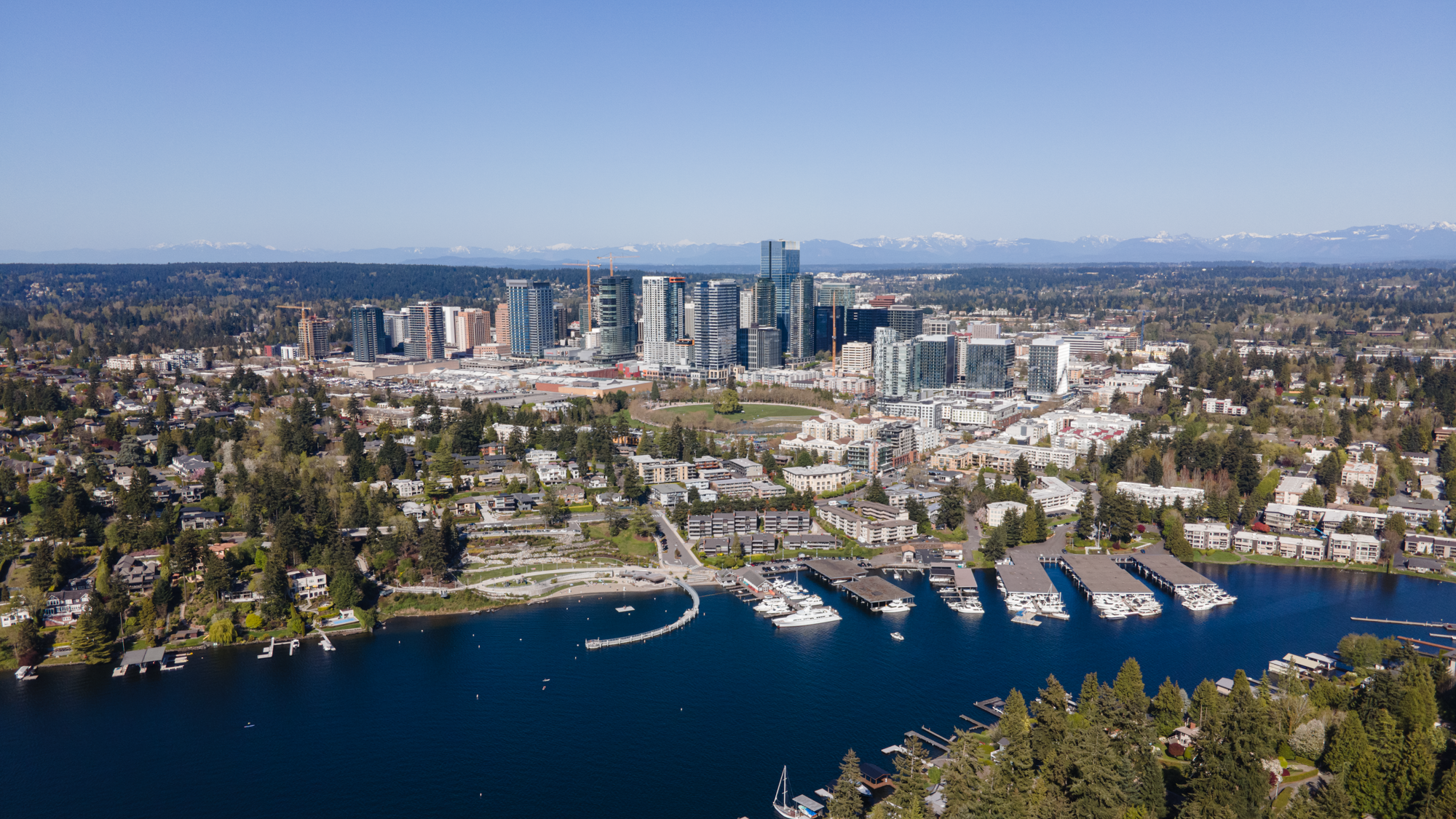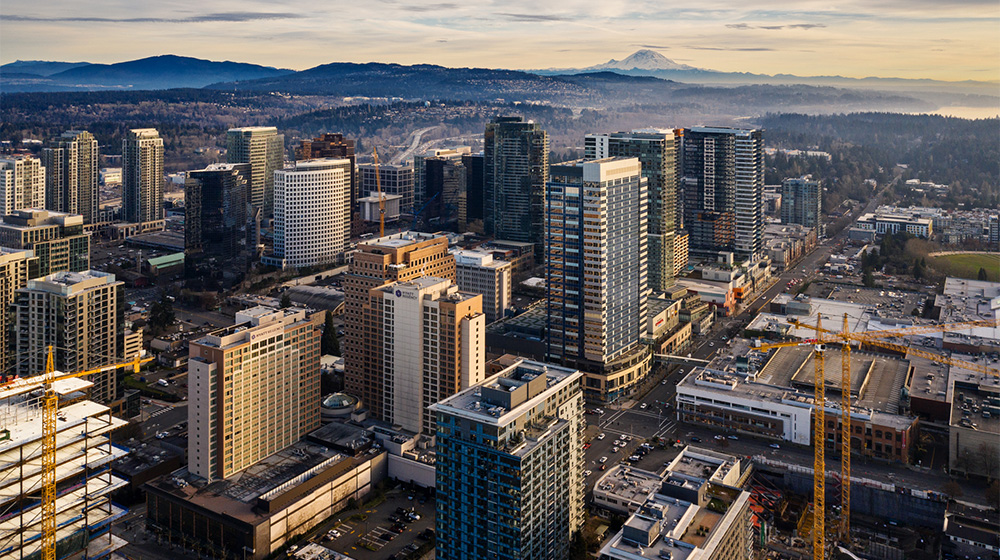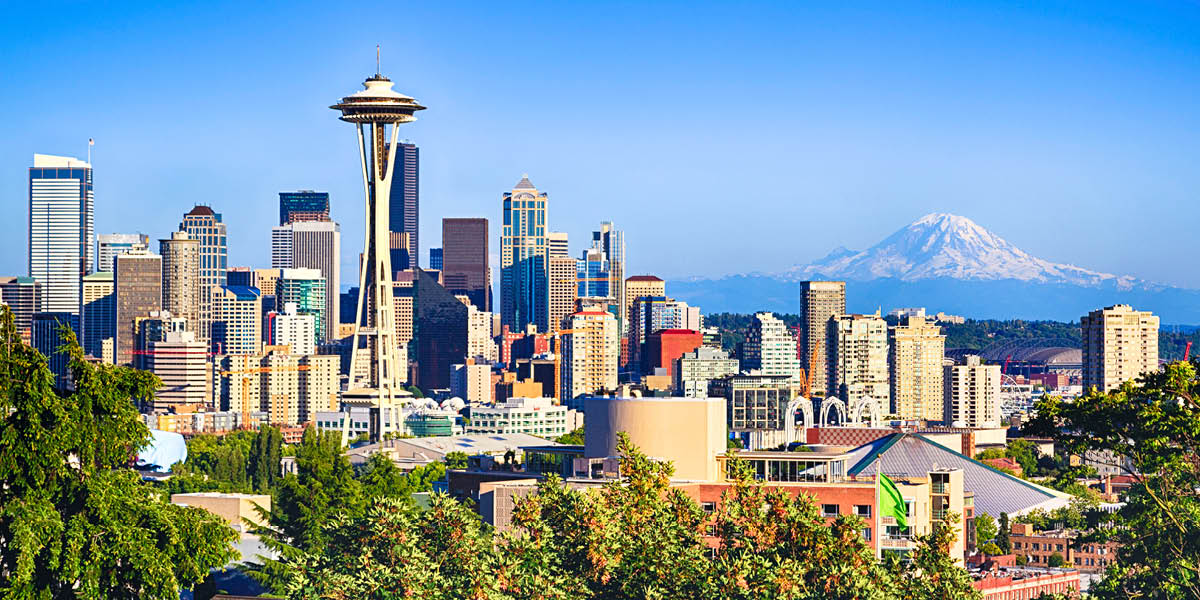With a cost of living index of 196.5, Bellevue ranks as one of the priciest cities to reside in within Washington State. Compared to the national index of 100, Bellevue's rating signifies it is 96.5% costlier across most living expense categories, with housing as the primary contributor.
Over the past few years, Bellevue's housing market has seen favorable changes, leading to increased median home values. This ongoing upward trend in the real estate sector has elevated the cost of living index consistently by up to 2% each year over the last decade. At present, there are no forecasts suggesting a decline in the cost of living index for the foreseeable future.

Table of Contents
Overview of Bellevue's Expenses
Let's start by looking at the main factors that contribute to Bellevue's high cost of living. We'll explore housing, utilities, and how these compare to national averages.
Bellevue Housing Market Insights
Bellevue's housing market is known for its high prices and competitive nature, with the median home value significantly exceeding the national average at approximately $1.4 million, showcasing the city's appeal and robust economy.
In recent years, Bellevue's real estate market has seen substantial growth, with property values increasing steadily. This trend is driven by factors such as the city's strong job market, excellent schools, and proximity to major tech companies.
For those looking to buy, it's important to note that the market can be quite competitive. Many homes receive multiple offers, often selling above asking price. Working with a local real estate agent can be crucial in navigating this challenging market.
Bellevue Median Home Value by Neighborhood
|
Neighborhood |
Average Home Value |
|---|---|
|
Woodridge |
$1,500,000 |
|
Phantom Lakes |
$1,250,000 |
|
Wilburton |
$1,400,000 |
|
Lake Hills |
$1,200,000 |
|
Eastgate |
$1,300,000 |
|
Robinswood |
$1,350,000 |
|
Crossroads |
$1,100,000 |
|
Bridle Trails |
$1,800,000 |
|
Lakemont |
$1,700,000 |
|
West Bellevue |
$2,500,000 |
|
Downtown Bellevue |
$2,400,000 |
These figures are indicative of the strong demand and limited supply in Bellevue's housing market, which consistently elevates home values across the city.
Bellevue Rent and Mortgages
When it comes to housing costs in Bellevue, both renters and homeowners face higher expenses compared to many other U.S. cities. Let's break down the typical costs for each option.
For renters, the average monthly rent for a one-bedroom apartment in Bellevue's city center is around $2,000, while outside the center it's about $1,700. Two-bedroom apartments average $2,500 to $3,000 per month, depending on location and amenities.
Homeowners, on the other hand, often face monthly mortgage payments of $3,000 to $4,000 or more, depending on the home's value and the terms of their loan. This is significantly higher than the national average mortgage payment.
It's worth noting that while housing costs are high, Bellevue offers many benefits that can justify the expense for many residents, such as high-quality schools and a strong job market.
Utility Bills Breakdown in Bellevue
Utility costs in Bellevue are another significant factor in the overall cost of living. These expenses can vary based on the size of your home and your usage patterns.
On average, a Bellevue resident can expect to pay around $150 to $200 per month for basic utilities (electricity, heating, cooling, water, and garbage) for a 915 sq ft apartment. This is slightly higher than the national average.
Internet services in Bellevue are robust, with high-speed options available from multiple providers. Monthly costs for internet typically range from $60 to $80 for high-speed plans.
It's important to budget for these ongoing expenses when considering a move to Bellevue. Some apartment complexes may include certain utilities in the rent, so be sure to clarify what's included when apartment hunting.

Everyday Living Costs in Bellevue
Beyond housing and utilities, there are many day-to-day expenses to consider when living in Bellevue. Let's explore the costs of groceries, dining out, and getting around the city.
Grocery Prices in Bellevue
Grocery shopping in Bellevue can be more expensive compared to the national average, reflecting the overall higher cost of living in the area. However, there are ways to manage these costs effectively.
A typical weekly grocery bill for a single person in Bellevue might range from $75 to $100, depending on dietary preferences and shopping habits. For a family of four, this could increase to $150 to $200 per week.
Some popular grocery chains in Bellevue include Safeway, QFC, and Whole Foods. For those looking to save money, consider shopping at stores like Fred Meyer or Costco for bulk purchases.
Local farmer's markets, while sometimes pricier, offer fresh, locally-sourced produce and can be a great way to support local businesses while enjoying high-quality food.
Dining Out and Entertainment in Bellevue
Bellevue boasts a diverse and vibrant dining scene, with options ranging from casual eateries to high-end restaurants. However, dining out regularly can quickly add up in terms of expenses.
A meal at an inexpensive restaurant in Bellevue typically costs around $15 to $20 per person. For a mid-range restaurant, expect to pay about $30 to $50 per person for a three-course meal.
Entertainment options in Bellevue are plentiful, but they can also be costly. A movie ticket, for example, averages around $12 to $15. Many of Bellevue's parks and outdoor spaces offer free recreational opportunities, which can be a great way to enjoy the city without spending much.
For those who enjoy nightlife, cocktails at a downtown bar can cost $12 to $15 each, while beer might be slightly less expensive at $6 to $8 per pint.
A complete dining experience at a luxury restaurant, including a three-course meal with drinks, may range from $150 to $300+ per person, depending on the choice of restaurant and menu selections.
Fitness, Recreational Sports, and Clubs in Bellevue
The city is home to numerous fitness centers, gyms, and recreational sports clubs. Membership fees for gyms, such as 24 Hour Fitness or LA Fitness, typically range from $30 to $50 per month. These facilities often provide access to swimming pools, group fitness classes, and personal training sessions at additional costs.
For those who prefer outdoor activities, Bellevue has an array of parks and trails for hiking, biking, and running. The city's extensive park system, including the popular Bellevue Downtown Park and Mercer Slough Nature Park, offers residents the chance to enjoy nature without any cost. Additionally, community sports leagues for soccer, basketball, and other team sports are available, with registration fees ranging from $50 to $150 per season.
Bellevue Transportation Expenses
Transportation costs in Bellevue can vary widely depending on your preferred mode of travel. For those who drive, it's important to factor in the costs of car ownership, including insurance, maintenance, and parking.
Public transportation in Bellevue is provided by King County Metro and Sound Transit. A monthly pass for unlimited rides on buses and light rail within the greater Seattle area costs around $99 to $117, depending on the zones covered.
For occasional public transit users, a one-way fare typically ranges from $2.75 to $3.25. Rideshare services like Uber and Lyft are also widely available, with costs varying based on distance and demand, anywhere from $30-$100+.
Bellevue is also becoming increasingly bike-friendly, with many dedicated bike lanes and trails. This can be a cost-effective and healthy transportation option for those living close to work or amenities.

Salaries in Bellevue
Average Monthly Salary in Bellevue
As of 2025, the average monthly salary for a resident in Bellevue is approximately $6,500, which translates to an annual income of around $78,000. This figure can vary significantly based on industry, experience, and education level. For example, professionals in the tech industry may earn higher than average salaries, reflecting the demand for specialized skills.
Comfortable Living Salary in Bellevue
A comfortable post-tax income would be around $5,500 to $7,000 per month, or $66,000 to $84,000 annually. Adjust this figure higher or lower based on personal lifestyle choices, dependents, and financial goals.
Keep in mind this estimate allows for a balanced lifestyle with room for savings, emergencies, and personal enjoyment in Bellevue's vibrant community.
Bellevue Education and Childcare
For families with children, education and childcare costs are crucial factors to consider when evaluating Bellevue's cost of living. Let's explore the options and associated expenses.
School Options and Costs in Bellevue
Bellevue is known for its excellent public school system, which is a significant draw for many families moving to the area. The Bellevue School District consistently ranks among the top in Washington State.
Public schools in Bellevue are free to attend for residents, but there are often additional costs to consider, such as:
-
School supplies: $50 to $100 per child annually
-
Technology fees: $20 to $50 per year
-
Field trips: $10 to $30 per trip
-
Sports and extracurricular activities: Varying costs
For those considering private education, Bellevue offers several options. Private school tuition in the area can range from $15,000 to $30,000 or more per year, depending on the school and grade level.
It's worth noting that the high quality of Bellevue's public schools often contributes to higher housing costs in desirable school districts.
Bellevue College Tuition Fees
For those considering higher education in Bellevue, it's crucial to factor in the cost of tuition at Bellevue College. As of the 2025 academic year, here are the tuition fees for Bellevue College:
-
In-state residents: Approximately $3,500 per year for full-time students.
-
Out-of-state residents: Approximately $9,800 per year for full-time students.
These fees exclude additional expenses such as books, supplies, and room and board. Bellevue College offers various financial aid options, including scholarships, grants, and work-study programs, which can help offset these costs. It's advisable to check the Bellevue College website for the most current tuition rates and financial aid opportunities.
Bellevue Childcare Services and Fees
Childcare costs in Bellevue are significantly higher than the national average, reflecting the area's overall high cost of living. This is an important consideration for families with young children.
Full-time daycare for an infant can cost between $1,500 to $2,000 per month in Bellevue. For preschool-aged children, costs typically range from $1,200 to $1,800 per month.
After-school care for school-aged children is also available, with costs ranging from $400 to $600 per month. Some options to manage these high costs include:
-
Nanny sharing with other families
-
In-home daycare providers (often less expensive than centers)
-
Flexible work arrangements to reduce childcare hours needed
It's advisable to research and secure childcare well in advance, as many quality providers have waiting lists.

Bellevue Healthcare and Insurance
Healthcare is another significant factor in Bellevue's cost of living. Let's examine the costs associated with medical services and insurance in the area.
Medical Services Pricing in Bellevue
Bellevue residents have access to high-quality healthcare services, but these can come with substantial costs. The pricing for medical services can vary widely depending on the type of care needed and your insurance coverage.
A routine doctor's visit in Bellevue typically costs between $100 to $200 without insurance. Specialist visits can range from $150 to $300 or more. Emergency room visits are significantly more expensive, often starting at $1,000 and increasing based on the level of care required.
For those without insurance, many healthcare providers offer sliding scale fees based on income. It's also worth noting that Washington State has laws protecting patients from surprise medical billing, which can help manage unexpected healthcare costs.
Insurance Considerations in Bellevue
Health insurance is a crucial consideration for managing healthcare costs in Bellevue. The cost of insurance can vary based on factors such as age, health status, and the level of coverage.
For employer-sponsored health insurance, employees in Bellevue can expect to pay an average of $100 to $200 per month for individual coverage, with employers often covering a significant portion of the premium.
Those purchasing individual health insurance through the Washington Health Benefit Exchange might pay anywhere from $300 to $600 or more per month for a mid-level plan, depending on age and other factors.
It's important to carefully compare plans and consider factors beyond just the monthly premium, such as:
-
Deductibles
-
Co-pays and co-insurance
-
Out-of-pocket maximums
-
Network coverage
Many Bellevue residents find that higher premium plans with lower out-of-pocket costs can be more economical if they anticipate needing significant medical care.

Bellevue vs. Major Cities (Seattle/Tacoma)
To put Bellevue's cost of living into perspective, it's helpful to compare it with other major cities in Washington State. Let's look at how Bellevue stacks up against Seattle and Tacoma.
Comparing Bellevue with Seattle Costs
Bellevue and Seattle, while close geographically, have some distinct differences in living costs. Here's a quick comparison:
|
Expense Category |
Bellevue |
Seattle |
|---|---|---|
|
Housing (Median Home Price) |
$1,000,000+ |
$800,000+ |
|
Rent (1-bedroom, city center) |
$2,000 |
$2,200 |
|
Utilities (Basic, Monthly) |
$150-$200 |
$150-$200 |
|
Public Transit (Monthly Pass) |
$99-$117 |
$99-$117 |
While Seattle tends to have slightly higher rental costs, especially in the city center, Bellevue often has higher home purchase prices. Both cities have similar costs for utilities and public transportation.
Seattle offers a wider range of neighborhoods and housing options, which can provide more flexibility in finding a balance between cost and lifestyle preferences.
Bellevue Cost Differences with Tacoma
Tacoma, another major city in the Puget Sound region, offers a significantly lower cost of living compared to Bellevue. Here's how they compare:
|
Expense Category |
Bellevue |
Tacoma |
|---|---|---|
|
Housing (Median Home Price) |
$1,000,000+ |
$400,000+ |
|
Rent (1-bedroom, city center) |
$2,000 |
$1,300 |
|
Utilities (Basic, Monthly) |
$150-$200 |
$130-$180 |
|
Public Transit (Monthly Pass) |
$99-$117 |
$72 |
Tacoma's lower housing costs make it an attractive option for those looking for more affordable living in the Puget Sound area. However, it's important to consider factors beyond just cost, such as job opportunities, commute times, and lifestyle preferences.
While Tacoma offers significant savings on housing and some other expenses, it may not provide the same level of amenities or job opportunities as Bellevue, especially in the tech sector.
When comparing these cities, it's crucial to weigh the cost savings against factors like career opportunities, quality of schools, and overall lifestyle to determine the best fit for your needs and budget.











































































































